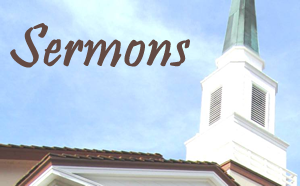 A sermon preached by Randle R. (Rick) Mixon
A sermon preached by Randle R. (Rick) Mixon
First Baptist Church, Palo Alto, CA
Sunday, September 27, 2015
Text: Luke 15: 1-3, 11-32; Romans 8:31-39; 1 Corinthians 15:50-58
A little over a year ago we began a journey with Brian McLaren. It was a journey through scripture as a sort of alternative lectionary. A big focus of the journey was a set of questions and considerations of what it meant to be alive. We journeyed through four major themes – “Alive in the Story of Creation,” “Alive in the Adventure of Jesus,” “Alive in a Global Uprising” and “Alive in the Spirit of God.” Covering the traditional church year, we began in Genesis and ended last week in Revelation – Alpha and Omega, beginning and ending, the story of our faith stretched out from start to finish. Today we are given a sort of epilogue – three of the most powerful and moving texts in the New Testament – the Parable of the Prodigal Son, Paul’s great assurance to the church in Rome that “nothing can separate us from the love of God in Christ Jesus” and his affirmation to the Christians in Corinth that “the trumpet will sound and the dead will be raised imperishable” for “death has been swallowed up in victory” as God “gives us the victory through our Lord Jesus Christ.”
Start to finish, we are invited to share with God in a kind of aliveness party. Celebrate, revel in the goodness of all that is and is to be. God is the great Host. Let the good times roll. Glasses will be full, tables groaning and the entertainment fabulous. Rejoice, the lost is found, the wanderer is home, the dead are alive. It’s time to party.
In the past I had not paid a lot of attention to the placement of the Parable of the Prodigal among the lectionary readings for Lent. We certainly don’t see Lent as party time. There is Mardi Gras, which is definitely party time, but that is before Lent, one last hurrah before we shut down for a season. Lent, at best, is a time of sober reflection before the celebration of Easter. It is preparation for a big party that comes after, but Lent itself usually means giving up indulgences and letting go of excess, not exactly party mode. Of course, a big part of the parable is the practice of repentance and that is surely Lenten material. This is a powerful story of the opportunity to turn one’s life around, whether one chooses to walk that road or not.
I especially love the line in which the gospel writer says the younger son “came to himself” or, better yet, “came to his senses.” “What a mess I’ve made of this precious life I’ve been given. Even daddy’s hired help are better off than I am. If I head home, maybe there will be a place for me to help out in the stables or the kitchen or the fields. Anything would be better than the fine fix I find myself in today.” This is a huge turn around, as the chastened child heads home, humbled and wiser for having come to his senses. This looks like big time repentance.
On the other hand, the older brother, who seems so upstanding and respectable, who has stayed close to his father’s side and who has been the “best little boy in the world,” is outraged by his father’s generosity and grace. If you stop to think about it, isn’t that a curious thing, to be angry with another’s generosity and grace? How dare you be kind and forgiving?
The story seems to say that the older brother has some repenting to do of his own, repentance that may be bigger and tougher than that of his naughty little brother. The opportunity is there. His father pleads with him to come inside and join the celebration of his brother’s return. The unanswered question, the question that Jesus is putting to the grumbling scribes and Pharisees, is whether or not the unrelentingly self-righteous can come to their senses, whether they can see their way clear to turning their lives around and joining the party.
Central to the Lenten discipline is the question of whether we can give up those things that get between us and God and others, whether we can let go of anything that separates us from the love of God in Christ Jesus. Paul says nothing really can – unless we allow it to. Or as Richard Rohr writes, “… no love is lost in the universe,” asserting that he believes that “you are actually punished by your sins; whereas Western religions tend to teach that you are punished for your sins. Goodness is its own reward and evil is its own punishment” (Richard Rohr, “Karma,” September 21, 2015, cac.org). And that brings us to party time.
As we read the entire fifteenth chapter of Luke in Bible study, I was struck more strongly than ever that each of the three parables ends in joy and a party – certainly not the way we usually approach Lent. But listen to what the texts tell us. When the shepherd has found the lone lost sheep, “he calls together his friends and neighbors, saying to them, ‘Rejoice with me, for I have found my sheep that was lost.’” And Jesus instructs, “Just so, I tell you, there will be more joy in heaven over one sinner who repents than over ninety-nine righteous persons who need no repentance” (Luke 15:6-7). When the woman finds her lost coin, “she calls together her friends and neighbors, saying, ‘Rejoice with me, for I have found the coin that I had lost.’” Jesus comments, “Just so, I tell you, there is joy in the presence of the angels of God over one sinner who repents” (Luke 15:9-10).
Then there’s the patient papa, waiting for his wandering boy to return so he can throw the most extravagant party the village has ever seen. Even the bitter, recalcitrant older son can’t stop the celebration. The people gathered in his father’s house party on, with or without him, though the invitation to join in is a standing one. No one wants him left out. But, as with each of us, he has to decide to accept the invitation.
Whatever else we find in this oh-so-familiar chapter of Luke’s gospel, there is joy, rejoicing, celebration, party time! And note that celebrating is never done in isolation. It’s not even the sort of private party the older brother wanted with just his friends. In each case the whole village is invited, friend and neighbors. Y’all come. Everyone’s welcome.
In fact, it was just a few verses before telling these parables that Jesus had said, “When you give a luncheon or a dinner, do not invite your friends or your brothers or your relatives or rich neighbors, in case they may invite you in return, and you would be repaid. But when you give a banquet, invite the poor, the crippled, the lame, and the blind. And you will be blessed, because they cannot repay you, for you will be repaid at the resurrection of the righteous” (Luke 14:12-14). Didn’t the Pope practice something like this just this week when he declined to dine with the power elite of our nation’s capital in order to lunch with some of the city’s poor citizens?
Barbara Brown Taylor writes of the parable, “…this is an alarming story. It is about hanging out with the wrong people. It is about throwing parties for losers and asking winners to foot the bill.” Contemporizing the parable, she projects, “…Jesus told this story to the ministerial association that was complaining about his dinner parties. He told them he could not hear them all the way across the restaurant, that they should come over and pull up some chairs. Because he saw them eating and he knew who they were — so clean, so right, so angry — he wanted to help them too, so he said, ‘Come meet my friends. Dessert is on me!’ And,” she concludes, “as far as I know, he is still waiting to see how the story ends” (Barbara Brown Taylor, “Table Manners,” The Christian Century, March 11, 1998. P. 257).
The invitation to party on is extended. Who knows how they – or we will respond? We make the road by walking. We are free to choose our way. “Two roads diverged in a wood, and I –/ I took the one less traveled by,/and that has made all the difference” (Robert Frost, “The Road not Taken”). Or, as Yogi Berra intoned, perhaps less elegantly, “When you come to a fork in the road, take it!” In order to participate in the party, you have to accept the invitation and show up, no matter how you get there.
So here is route we’ve been walking the last year. “In the beginning God…” (Genesis 1:1). Now, “God in the End.” We move from God to God. It’s the rhythm of life. In fact, it’s all about life, aliveness, liveliness, and, in the end, an invitation to party on. Yes, there are rough times, hard tasks, pain and suffering, detours, disappointment and even death, such as it is. But, in the end, the God who created everything and called it very good chooses to fulfill all the promise of that creation, to redeem it and reconcile it to God’s Self through Christ Jesus. McLaren writes, “…we look forward to a festive celebration that beckons us from the future. The story began in God’s creative love, and it ends in God’s creative love, too…if such an ending can even be called an ending…The whole story flows toward reconciliation, not in human creeds or constitutions, but in love, the love of the One who gave us life and being (Brian D. McLaren, We Make the Road by Walking, pp. 261, 262).
In the beginning God; in the end God; and all along the way, God – with us, in us, through us. God and the eternal invitation to party on. Amen.

















